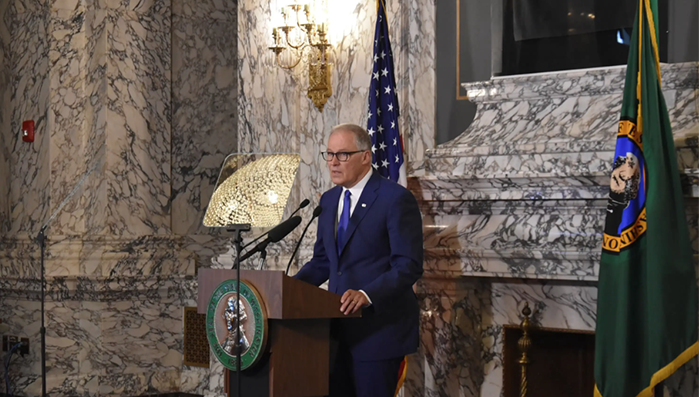||| FROM THE OFFICE OF GOVERNOR JAY INSLEE |||
Legislators hold hearings on slate of reproductive freedom bills

Gov. Jay Inslee testifies on Tuesday, Jan. 24 to the Senate Long-Term Care & Health Committee in support of a proposal to amend the state constitution to guarantee the right of reproductive choice.
In the six months since the Dobbs v. Jackson Women’s Health Organization decision by the U.S. Supreme Court, 24 states have banned or severely restricted abortion care.
On Tuesday, legislators heard a slate of bills that seek to strengthen and expand reproductive rights and services in Washington state. Among the package are bills to amend the state constitution, strengthen data privacy protections, improve oversight of hospital mergers that result in reduced access to abortion or gender-affirming care, prohibit cost-sharing for abortion, protect patients and employers, and shield providers and their WA licenses from retribution by other states.
Gov. Jay Inslee was among those to testify to the state Senate Long-Term Care & Health Committee on the proposal to amend the state constitution. Opponents of the amendment said they believe Washington state’s law is “settled” and they don’t imagine our laws ever changing, but the governor reminded the committee that without an amendment, those laws can change depending on who is in office or on the Supreme Court bench.
“Fundamentally, this is an issue of freedom,” said Inslee. “It is an issue of freedom to have the most intimate decision of a woman’s life to be determined by her, not someone she has never met.”
READ: Washington lawmakers hear testimony on 7 abortion bills (Associated Press)
New state-operated community-based behavioral health cottage opens in Lewis County

The new Civil Center for Behavioral Health at Maple Lane opened on Jan. 27 in Rochester, WA. The spacious, comfortable facility allows ample sunlight, excellent views throughout, and a safe and secure setting.
The state Department of Social and Health Services opened its first residential treatment facility near Rochester on Friday. The opening of the Civil Center for Behavioral Health at Maple Lane is a major milestone in Gov. Jay Inslee’s behavioral health transformation effort to create more community-based care settings that allow Washingtonians to receive treatment as close to home and family as possible.
The new facility has 16 beds and will host patients in a secure and therapeutic setting for 90 to 180 days at a time. The net-zero facility was built with sustainable materials and generates solar power for clean, cheap energy. The site will have controlled entrances and exits for security, and agreements with local law enforcement area already in place.
Statewide, an additional 10 facilities will be completed by 2024 and provide 239 beds. Construction will then begin for another 76 beds.
“Recovery is enhanced by proximity to family, friends, and community,” said Inslee. “Care closer to home is better care.”
Reducing traffic deaths is a bipartisan priority

Lawmakers representing both parties and traffic safety advocates announced a series of proposals Thursday in Olympia intended to reduce record traffic death statewide – 745 Washingtonians were killed in 2022 in traffic accidents. Amber and David Weilert lost their 13-year-old son Michael. Sen. John Lovick, a former Washington State Patrol trooper, shared his experiences breaking devastating news to families, and called for difficult changes to address record death.
Legislators and traffic safety advocates gathered Thursday in Olympia to announce a bipartisan slate of bills intended to reduce record traffic death in Washington state. In 2022, 745 Washingtonians died on roads throughout the state, marking a fourth consecutive year with an increase in traffic death.
Among those killed was 13-year-old Michael Weilert of Parkland. His parents, Amber and David, attended and called for pedestrian improvements to spare other families of similar grief.
“Safe transportation choices are guided by policy-makers, engineers, and sometimes by a grieving mother who lost her son,” said Amber Weilert. “People are counting on us to do what is right, what is safe – and to put human life first and foremost.”
Bills under consideration this session include a reduction in the legal blood-alcohol concentration limit to 0.05, speed camera enforcement in work zones, extended DUI lookback periods, support for low-income drivers to receive training, enhanced young and old driver safety standards, prohibition of free right turns on red lights, and others. Behavior changes might be difficult but necessary, according to Sen. John Lovick.
“People hate change, but they also hate the way things are,” said Lovick. “We are losing one person every single day on our roads. By this time tomorrow, two people will be dead. That should be unacceptable.”
Boat battery manufacturer opens in Bellingham

The Orca Energy ESS battery system is the large white column at right of a group of Corvus Energy employees, Gov. Jay Inslee, Norwegian Ambassador to the United States Anniken Krutnes, and U.S. Rep. Rick Larsen. Larsen, Inslee, and Krutnes each spoke at the opening of Corvus Energy’s new Bellingham facility.
In September during a trade mission to the Nordic counties, Gov. Jay Inslee sailed through Norwegian fjords aboard an all-electric ferry powered by a Corvus Energy battery. On Monday, the governor cut the ribbon on a new facility in Bellingham where Corvus Energy will manufacture batteries for the American market.
Corvus Energy’s Orca Energy battery can power a variety of vessels, including electric ferries that will soon operate in the Puget Sound. The first American-made all-electric tugboat is also soon to debut, powered by the Orca Energy system.
Gov. Jay Inslee was joined on his visit to Bellingham by Norwegian Ambassador to the United States Anniken Krutnes and U.S. Rep. Rick Larsen.
“This is a milestone in our joint effort to develop a cleaner maritime industry and clean up the green transition,” said Krutnes. “Now and in the future, the green transition will be the most important element in our economic cooperation.”
Legislative session – week 3 in review
Friday marks the 19th day of the 105-day legislative session. As mentioned above, committees held hearings on a suite of bills to strengthen reproductive access and rights, and legislators convened a bipartisan press conference about traffic safety proposals. More than 1,000 bills have been filed this session so the pace is picking up to hear and move bills before the committee cutoff dates in February.
Committees this week moved bills forward that would increase the penalty for hazing, create a cold case investigations unit for missing and murdered indigenous people, restrict the sale of cosmetics with certain toxic chemicals, and require six months’ notice for rent increases over five percent. Committees also moved additional gun safety bills forward including the assault weapon bill requested by the governor and attorney general and the governor’s request legislation to require training before purchasing a firearm. Next week’s possible committee votes could include a bill to end puppy mills and to limit nighttime use of lights on wind turbines.
Outside the Legislature, the Washington Supreme Court heard arguments this week about the state’s new capital gains tax. Washington has the most regressive tax structure in the country, and legislators passed the capital gains tax in 2021. The tax only applies to very wealthy individuals and is expected to be paid by about 7,000 people. At the same time the capital gains is going into effect, so is the new Working Families Tax Credit which will provide up to $1,200 back to more than 400,000 low-income Washington households. Applications open next week on Feb. 1.
News you might have missed:
New Seattle convention center to host global events, boost Seattle’s downtown
Seattle is now an even more appealing destination for major economic exchanges since the new 574,000 square-foot, $2 billion Seattle Convention Center opened its doors. Already 58 events are booked, each to gather national and international industry in Seattle’s downtown.
New director named for Department of Veterans Affairs
Gov. Jay Inslee Wednesday appointed David Puente, Jr. as the director of the Washington State Department of Veterans Affairs. WDVA serves Washington state’s veterans and their families by connecting them to benefits earned while serving in the military. Puente is an Army veteran. He had served as WDVA’s deputy director since February 2020, leading the State Veterans Homes program through the pandemic.
State agencies take action to reduce chemical deadly to coho salmon
For decades, coho salmon returning to urban streams and rivers in the Puget Sound region were dying before they could lay their eggs. 6PPD-quinone, a toxic chemical released from automotive tires, was found to be the culprit in 2020. The state Department of Ecology is now launching new efforts to reduce stormwater pollution and address sources of 6PPD to save native salmon.
Emergency need for blood donations
January is National Blood Donor Month, and the Washington State Department of Health (DOH) urges eligible blood donors to donate. Blood is safe to donate and lifesaving to recipients. Donations are critical for patients undergoing surgeries, cancer treatments, childbirth complications, and other potentially life-threatening conditions.
“Every two seconds, someone in the United States needs blood,” said Angel Montes, Donor Services Executive, Red Cross Northwest Region. “You can help patients in need by making a blood or platelet donation today.”
Correction
Last week’s newsletter described new research related to health effects of gas stoves. A 2013 paper, not a new paper, showed that residential gas stoves increase the risk of childhood asthma by nearly 42%. The new paper’s finding was that 12.7% of current childhood asthma nationwide is attributed to residential gas stove use, a figure similar to the burden attributed to secondhand smoke exposure.









If we had police to enforce the traffic laws that we have now, we wouldn’t need additional new laws. You have to remember that people that break laws will not follow new laws either.